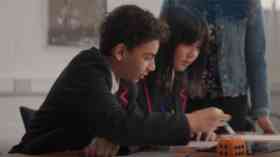
The need for equal Physical Education
The government is currently reviewing the national curriculum, calling into question the importance, accessibility, and quality of Physical Education taught in schools. David Clarke, CEO of ParalympicsGB, sheds light on the importance of the Equal Play Campaign for addressing the inequalities disabled children face in PE lessons, and how policymakers and schools can do better at prioritising inclusive exercise.
Please tell us about the Equal Play Campaign, why was it started and what is its aim?
The Equal Play campaign emerged from powerful stories shared by Paralympians. While some athletes had inspiring teachers and inclusive Physical Education (PE) lessons that shaped their sporting careers, many recounted a much different experience – being left on the sidelines, unable to fully participate while their classmates enjoyed physical education.
These personal stories were supported by stark data on disabled children’s participation in PE and school sport: only 25 per cent of disabled children take part in school sports regularly, compared to 41 per cent of non-disabled children. Even more concerning, one-third of disabled children get less than 30 minutes of physical activity each day.
Acting on these stories and statistics, ParalympicsGB launched the Equal Play campaign to address the inequalities that exist for disabled young people accessing PE. Research carried out by ParalympicsGB shows there are many reasons why disabled children are sidelined from PE at school.
Solutions are complex but there are four areas identified where tangible change could be made to better support teachers and schools. Firstly, teachers can be empowered with the right tools, understanding and resources, and training can be adapted to ensure future teachers have the skills and confidence to deliver truly inclusive PE. Ensuring PE becomes a priority through redefining how it is seen within the school curriculum, and increasing the number of disabled people entering the teacher profession would also encourage the education system to be more inclusive.
The government is currently reviewing the national curriculum. What changes would you want when it comes to PE in schools?
ParalympicsGB is asking for the reprioritisation of physical education within the national curriculum, an overhaul and modernisation of the PE curriculum, and an increase in the quantity of PE provided in schools.
Physical education sits outside the core subjects on the national curriculum and through qualitative interviews is often seen as an add-on in a crowded timetable, with senior leaders struggling to give it curriculum time amidst competing pressures, despite the wide range of benefits that it can deliver.
Even when PE is prioritised within the curriculum, teaching approaches often emphasise traditional sports, which can be more difficult for disabled children and young people to participate in. This narrow focus limits opportunities for all children to engage in physical activity in ways that suit their abilities and interests.
Through the curriculum review we’re seeing a cultural shift in how PE is viewed, moving away from a narrow focus on traditional sports towards a broader concept of physical literacy that celebrates diverse ways of being physically active and delivers widespread benefits, particularly for disabled children such as mental health and movement.
For disabled children in particular, there is not enough opportunity to access physical education and school sport within the school day. In February 2022, the government published the first ever guidelines recommending disabled children undertake at least 120 minutes of aerobic physical activity per week; significantly less than the one-hour daily recommendation for non-disabled children.
Despite being publicly available, many schools do not know about the existence of these guidelines. Through the curriculum review we’re calling on the government to make sure that this information is circulated into school networks, alongside a strong steer of equity rather than a focus on the differential between disabled and non-disabled children.
Why is it so important that schools make time for good quality PE?
Ensuring time for good-quality PE in schools is essential because it benefits students in so many ways beyond improving physical health. One of these is improved mental health, as being active can reduce stress, improve mood, and build self-confidence. This is especially important during the challenges of growing up.
Other benefits include increased learning and focus, helping children and young people perform better in their academic studies, and the enhanced social skills from the teamwork, communication, and collaboration that PE encourages, helping students build friendships and work with others. Teaching young people to enjoy being active also sets them up to stay healthy throughout their lives, not just during their school years.
These benefits can be even greater for young disabled people as participating in PE also helps balance and coordination, social skills development, and behavioural improvement. For these reasons, ensuring PE is prioritised and delivered in a way that is inclusive and enjoyable for all students is a vital part of education.
What are some of the problems that arise when PE is not inclusive for all pupils?
Through our research for the Equal Play campaign, we heard many stories of young people excluded from PE and the impact this has on students from under-resourced communities, but in particular disabled students.
When disabled young people are not included within physical education lessons this often leaves students feeling left out and isolated from their peers, which can lead to a sense of being excluded from the school community.
When PE lessons are not designed with inclusion in mind young disabled people who cannot join in or miss out on the physical and mental health benefits of staying active, such as improved fitness, reduced stress, and better overall well-being. A lack of inclusive PE can also damage self-esteem, making students feel they aren’t good enough or valued in sports or physical activities.
PE isn’t just about exercise, it’s a chance to acquire teamworking and problem-solving skills and so pupils aren’t included miss opportunities to develop these important skills.
When PE is not inclusive for all pupils, particularly disabled young people, this can also cause problems amongst non-disabled students. Excluding disabled people can reinforce stereotypes, unintentionally perpetuating negative attitudes about disability, diversity, or physical ability, impacting how students see themselves and others.
In what ways can schools make PE more inclusive and include more diverse ways of being physically active? What resources and support are available to teachers that want to improve their PE provision?
ParalympicsGB leads and supports several programmes designed to help schools and teachers create more inclusive physical education lessons and environments. These initiatives provide valuable free tools and resources for teachers across primary and secondary schools to engage all students in physical activity.
Get Set | Welcome to Get Set is the award-winning youth engagement programme by ParalympicsGB and Team GB. It offers teachers, young people, and others working with students a wide range of resources and activities that can be used in the classroom, playground, or community. The website also creates a space for schools to share best practices and learn from each other.
Inclusion 2024 inclusive education hub brings together essential resources for inclusive PE and school sports, all in one convenient space for educators. Developed by Activity Alliance, Youth Sport Trust, and the Department for Education, the hub aims to support PE teachers in engaging more disabled students in physical activity.
These programs provide schools with the tools and guidance they need to ensure every child can participate and thrive in PE.
Further Information:Latest News
08/01/2026 - 10:30
The government is launching a new app allowing students to view their GCSE results on their phones for the first time from this summer.
08/01/2026 - 09:45
Education Business LIVE has announced that Professor Samantha Twiselton OBE of Sheffield Hallam University will speak at the event in March 2026, delivering two thought-provoking sessions focused on initial teacher training and SEND provision.
07/01/2026 - 10:10
Solve for Tomorrow is a free, curriculum-linked programme which is mapped to Gatsby Benchmarks 4, 5, and 6, helping teachers embed careers education without adding to workload.
06/01/2026 - 10:24
London's universal free school meals programme has not led to improvements in pupil attainment during its first year, but has eased financial pressure and reduced stress for families.
05/01/2026 - 10:44
New regulations have come into force from today, banning adverts for unhealthy food and drinks before 9pm, and online at all times.







